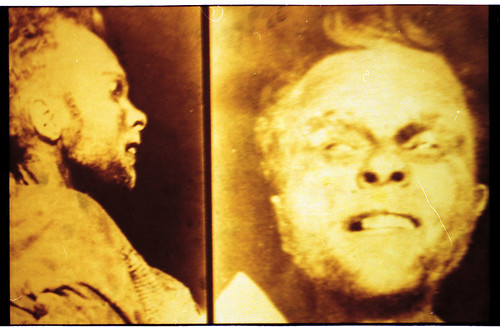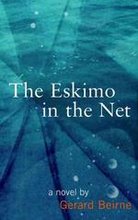Cranky Meets The Mad Trapper

Somewhere en route I bought The Mad Trapper by Rudy Wiebe - a fictionalised account of Albert Johnson who in the early 1930s became the object of the largest manhunt in Royal Canadian Mounted Police history. For fifty days in the bitter cold of an Arctic Circle winter he avoided capture becoming the first man to cross the Richardson Mountains in a blizzard along the way. Fascinating story and of course another part of the myth of the North.
This myth intrigues me no end. Once Robert Kroetsch wrote something along the lines that North Americans when they want to write the great novel go North whereas Europeans go West. I told him once that there was a strange breed of Irish men who like to go both North and West. And so I have done. Still waiting on the great novel though. Another case of bad timing (like Upbeat Deadbeat I probably missed it by two days).
Thing is. writers are terribly cranky readers (you better check out Upbeat Deadbeat again). I may be one of the crankiest. So while the narrative of The Mad Trapper was strong it was hard to know what the story really was and whose story it was. Most often the third person narration directs us into Spike Millen’s point of view - the officer who was chasing him, but despite being in his point of view we learned very little about his character. There were other lesser characters who came across almost as much as him. If he was the main character, and it sure seemed that way, what is the story? The plot is clear. He is chasing this individual, almost obsessively in the end. Now it raises great questions. Is his obsession any different than the fugitive? Also we know he wishes to understand what is making this man run in the way he does. Johnson’s effort is almost superhuman. This is really interesting since the other officers just want him caught, aren’t really thinking of him as a person. Yet none of this is evidently the ‘story’. In fact, the story is quite simply unclear.
You know what Cranky Dead Beat thinks. The point of view is wrong. It should have been told in first person, Spike Millen’s. Then we would have known more directly what drove him. We would have had more access to his thoughts and emotions. Now I know Third Person can do this too but not as effectively. To quote Kroetsch again - a man walks into the wilderness, that’s the only story. So what is Millen’s wilderness, and how does this reveal for us the unknown story - the story of Albert Johnson (who was not Albert Johnson at all but a man who has never been identified)? We can learn about ‘Johnson’ from understanding Millen.
Now this could all be a nonsense on my part. Fancy Cranky thinking he has anything to teach Mr Wiebe, a writer whose shoes Cranky would dearly love to fit (the best I could hope to do is play him at pool - gosh darn it just go and read Upbeat Deadbeat would you!). But the point is not about being right or wrong. The point is about thinking about the craft of the writing process. And The Mad Trapper got me thinking.
Another writer who taught me so much, Mr. John Keeble (see Writer’s Workshops - or How Do We Cope With Gerry?) proposed that point of view was the single most important element in fiction. Being as cranky as ever I thought that maybe Time was (our treatment of it), but that was then.










No comments:
Post a Comment